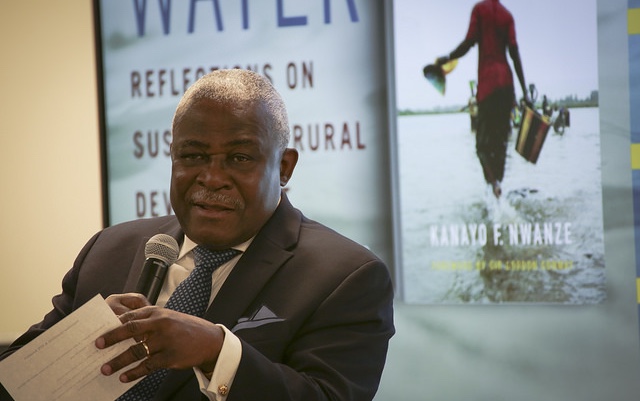“Where I come from in Nigeria, there is a saying that when you go to the stream to fetch water, your bucket will only be filled with the water that is yours. No one can take the water that is meant for you,” Kanayo F. Nwanze said at the recent launch event for his new book, A Bucket of Water: Reflections on Sustainable Rural Development, co-hosted by IFPRI and Center for Strategic and International Studies (CSIS).
Elaborating on that African parable, the former president of the International Fund for Agricultural Development (IFAD) recalled how his mother always egged him on, asking him to fetch his own bucket of water. “Over the years, I have understood, this parable is about destiny,” he said. “It is about choices and making the future better than the present. No one gets their bucket of water if there is no longer any river.”
Nwanze compared the UN’s 2030 Agenda for Sustainable Development to the river. The Sustainable Development Goals (SDGs) seek to “leave no one behind,” he said, by helping to create the conditions and environment for each person to live with dignity and achieve their fullest potential. The book recounts stories from his time at the helm of IFAD, including his discussions with presidents, prime ministers, ministers, project staff—and above all, ordinary people on his many visits to rural communities.
In her introductory remarks, Julie Howard, senior advisor (non-resident) at the CSIS Global Food Security Project, who also directs Michigan State University’s Agrifood Youth Opportunity Lab, described Nwanze’s greatest achievement as expanding IFAD’s circle of influence beyond agriculturists to include development practitioners and securing the support of African heads of state—ultimately helping Africa’s recovery from the global food crisis of 2007-08. Nwanze won the 2016 Africa Food Prize, in part for these efforts.
Howard laid out the four key messages of the book: Agricultural development as essential to African development; small farmers are at the center of farming; smallholder farming as a business model; and IFAD’s focus on empowering women and the role of youth under his leadership. The book is peppered with rich anecdotes and stories from the hinterlands of the African continent, which is still waiting to fetch its bucket of water.
In a discussion moderated by Rajul Pandya-Lorch, IFPRI’s communications and public affairs director and chief of staff, Nwanze told the audience that he was mocked by many in the development field when he first proposed the idea that smallholders’ activity, too, is a business. “They thought I was stupid,” he said. “But smallholders’ activity is an economic activity, which should raise profits.” People who live in villages share the same dreams as their counterparts in cities: Giving their children a good education and a livelihood. It is imperative that the global community invest in rural infrastructure and in removing obstacles that prevent small farmers from building a business, he said.
As many young people migrate from rural areas to cities, Nwanze stressed the urgent need to transform rural agriculture, and to provide opportunities for youth to become agripreneurs. Meanwhile, he said, serious gaps in leadership and policy implementation continue to impede Africa’s long-term economic growth. Institution building has made a difference in Rwanda and Ethiopia, Nwanze added.
In his closing remarks, IFPRI Director General Shenggen Fan applauded Nwanze’s leadership in driving the global agenda for development, women’s empowerment, and enhanced investments in rural areas to stem youth migration—and welcomed his new role as the CGIAR System Management Board’s First Global Ambassador.
Smita Aggarwal is an IFPRI Communications Specialist.







